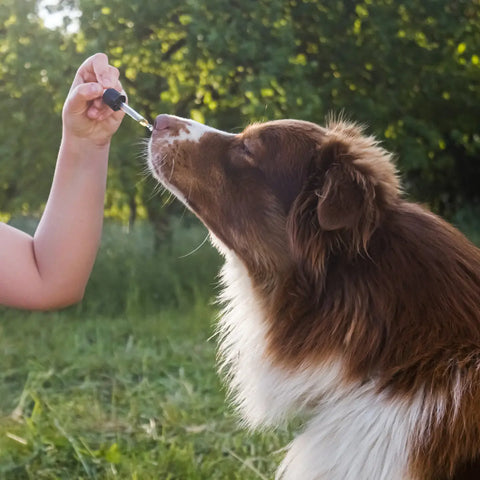In recent years, the conversation surrounding pet anxiety has gained significant momentum. Many pet owners are increasingly reporting signs of anxiety in their furry companions, which manifests through behaviors such as excessive barking, chewing, or even aggression. As our understanding of pet anxiety deepens, the quest for effective solutions to alleviate their stress has become a focal point in ensuring the well-being of our beloved animals. In light of this, THC dog chews and other THC-infused products are emerging as potential solutions to combat pet anxiety. Unlike the more commonly known CBD, THC (Tetrahydrocannabinol) is a compound found in the cannabis plant that has psychoactive properties. While traditionally associated with creating a 'high' in humans, when administered in the correct dosages, THC can potentially offer calming effects for dogs without the unwanted psychoactive side effects. This blog post aims to explore the potential benefits of THC in managing pet anxiety. We will delve into the science behind THC’s calming properties, compare THC with CBD, and discuss the variety of THC canine supplements available. Through this exploration, readers will gain insight into THC as an alternative solution for pet anxiety, learn about responsible administration, and understand the importance of veterinary guidance in this realm.

Understanding THC in the Pet Wellness Sphere
THC Vs. CBD: Key Differences and Potential Benefits
Both THC and CBD are compounds found in the cannabis plant, yet they possess different properties and potential benefits for pets. While CBD has been widely recognized for its ability to help with various ailments without creating a high, THC has been less explored in the pet wellness sphere due to its psychoactive nature. However, emerging evidence suggests that THC, when administered in controlled, low doses, could provide a range of benefits, including anxiety relief, making THC-infused dog treats a topic of growing interest.
The Science Behind THC's Calming Properties
The calming properties of THC can be attributed to its interaction with the endocannabinoid system (ECS) present in both humans and animals. The ECS is responsible for maintaining balance in the body and plays a role in various physiological processes, including mood regulation. THC interacts with the cannabinoid receptors in the ECS, which can result in a calming effect, making it a potential option for managing anxiety in pets. The exploration of hemp treats with THC could pave the way for new, natural anxiety remedies for dogs.
The Shift Towards THC-Infused Dog Products
The growing interest in natural remedies for pet ailments has fueled a shift towards THC dog edibles and other THC-infused products. With more pet owners looking for holistic approaches to pet wellness, the market for THC dog products is expanding. However, it's essential to tread with caution. The legal landscape surrounding THC products for pets is still evolving, and the importance of adhering to local laws and regulations cannot be overstated. Moreover, the need for more research to fully understand the implications and benefits of THC for pet anxiety is evident.
How THC Treats Combat Anxiety in Dogs
Mechanism of Action: How THC Impacts the Canine Brain
The mechanism through which tetrahydrocannabinol (THC) potentially alleviates anxiety in dogs centers on its interaction with cannabinoid receptors in the brain, specifically the CB1 and CB2 receptors. These receptors are integral components of the endocannabinoid system, a complex network of neurotransmitters and receptors that plays a critical role in maintaining physiological homeostasis in mammals.
This system regulates various functions, including mood, pain sensation, appetite, and memory. When dogs consume products like THC-infused chews, the THC molecules bind to these cannabinoid receptors. This binding mimics the action of naturally occurring endocannabinoids, which are substances that help maintain balance in the nervous system. The interaction between THC and these receptors can initiate a series of cellular responses that promote relaxation and reduce anxiety.
Observable Changes: Reduction in Anxiety-Driven Behaviors
Pet owners who have tried THC canine supplements often report noticeable changes in their dogs' behavior. Typical anxiety-driven behaviors such as excessive barking, restlessness, or destructive chewing may diminish. Moreover, dogs may appear to be more relaxed and less triggered by the usual anxiety-inducing stimuli. While individual responses to THC may vary, the reduction in anxiety-driven behaviors can significantly contribute to an improved quality of life for both the dogs and their owners.
Comparing THC Dog Edibles with Traditional Anxiety Treatments
Traditional treatments for canine anxiety often involve pharmaceutical medications that may carry potential side effects. On the other hand, THC dog edibles present a more natural alternative. While the research on THC’s efficacy is still burgeoning, the potential for fewer side effects makes it a compelling option for pet owners. Moreover, THC-infused products can be easier to administer, as they come in various forms like treats and chews, which dogs find palatable.
Exploring the Variety of THC Dog Products
From THC Dog Biscuits to Chews: Which Is Best?
The market for THC-infused dog products is rapidly expanding as pet owners seek alternative methods to combat pet anxiety and other ailments. Among the various options available, THC dog biscuits, chews, and oils are becoming popular due to their unique benefits and ease of use. Biscuits and chews are particularly favored for their convenience; they can be given as treats, making them an excellent choice for picky eaters or dogs that resist traditional medication forms. These products are formulated to ensure a palatable taste and can be easily integrated into a dog's routine.
Oils, on the other hand, offer precision in dosing, which is crucial for maintaining the safety and health of the pet. They can be mixed with food or administered directly, allowing for flexibility depending on the dog's acceptance. The precise dosing also helps in effectively managing the dosage to combat specific conditions like anxiety, with minimal risk of overdose. Choosing between these forms generally depends on the dog's preferences and the owner's desire for ease of administration.
Navigating the World of Hemp Treats with THC
Navigating through the variety of hemp THC for dogs can be overwhelming, given the plethora of products available. When looking for THC-infused dog products, it's crucial to consider the source of hemp, the concentration of THC, and the presence of other ingredients that could either enhance or negate the intended effects of THC. Opting for products from reputable manufacturers who provide third-party lab testing results can help ensure you're getting a high-quality product.
Determining Quality: What to Look for in THC-Infused Dog Treats
Quality is paramount when choosing THC-infused dog treats for your pet. Look for products that have clear labeling regarding the THC content, and ensure they are sourced from reputable manufacturers adhering to quality standards. Additionally, opt for treats that have undergone third-party testing to verify their cannabinoid content and purity. Engaging with a veterinarian can also guide you in selecting high-quality THC products that can safely be integrated into your dog’s wellness routine.
Dosage and Safe Administration Practices
Starting Small: Introducing THC Snacks for Dogs
The use of canine THC products requires a careful and informed approach, especially when administering items like THC dog biscuits. Adhering to the principle of 'less is more,' starting with a minimal dose and gradually adjusting it provides a safe baseline from which to observe your dog's response. The ideal THC dosage for any canine depends heavily on a variety of factors. Administering a low initial dose allows pet owners to monitor their dogs for any adverse reactions or sensitivities to THC, which can vary significantly between individual animals. This method helps prevent potential overdosing, ensuring that the dogs benefit from the intended therapeutic effects without harm.
Adjusting Dosages Based on Size, Age, and Observed Effects
Adjusting the dosage of canine THC products is crucial to achieving the desired calming effects without causing any undue psychoactive reactions. Factors such as the size, age, and overall health of your dog play a significant role in determining the appropriate dosage. Moreover, the observed effects and any side effects should guide the adjustment of the dosage. It’s important to maintain close communication with your veterinarian throughout this process to ensure that the THC products are benefiting your dog as intended.
Recognizing and Addressing Any Potential Overconsumption
Overconsumption of THC can lead to adverse effects in dogs. If a dog consumes too much THC, it might experience symptoms like prolonged sedation, disorientation, or extreme anxiety. Hence, it's crucial to follow the dosage guidelines provided by the manufacturer or your veterinarian. If you suspect that your dog has consumed a large amount of THC, contact your veterinarian immediately. The emphasis on responsible administration cannot be overstated when it comes to ensuring the safety and effectiveness of THC dog edibles.
Precautions and the Role of Veterinary Guidance
Potential Side Effects and Signs of THC Overdose in Pets
THC, like any substance, has potential side effects and can be toxic if misused. Understanding the signs of THC toxicity is crucial when administering these supplements to pets. Awareness and timely intervention can mitigate risks and provide the necessary care quickly. Here are the common symptoms to watch for:
-
Lethargy: Pets experiencing THC overdose often show marked lethargy. They may appear unusually tired, unresponsive, or less alert than usual. This change in energy levels can be a preliminary indicator of toxicity. The subdued behavior is often the first sign that a pet owner might notice, signaling that the THC dose may be too high. Monitoring your pet’s energy levels after administering THC can help catch this symptom early, which is essential for preventing more severe side effects.
-
Urinary incontinence: Another symptom of THC overdose in pets is urinary incontinence. This can involve accidents in the house by pets who are normally well-house-trained. Such loss of bladder control can be distressing for both the pet and the owner, indicating a significant reaction to THC. It's a visible and impactful symptom that underscores the need for careful dosage control and immediate veterinary consultation to adjust the treatment plan appropriately.
-
Loss of balance: Pets affected by an overdose of THC might also struggle with coordination, showing signs of loss of balance. They may stumble, sway, or have trouble standing up, which could lead to injuries if not monitored. This motor impairment reflects THC’s effects on the nervous system, and observing these changes can be critical for preventing accidents and further health complications.
-
Coma in severe cases: In extreme cases, an overdose of THC can lead to coma. This is a life-threatening condition where the pet becomes entirely unresponsive and requires immediate medical attention. Coma represents a critical emergency and underscores the importance of adhering to precise dosing instructions for THC supplements. Quick veterinary intervention is imperative to help reverse the toxic effects and safeguard your pet’s health.
Monitoring your pet for these symptoms is a vital part of responsible pet ownership when THC supplements are used. Recognizing these signs early can help manage the situation effectively. Ensure that you always have a plan in place and keep your vet’s contact information readily accessible. Handling these situations with care and prompt action can make a significant difference in the health and well-being of your pet.
The Non-Negotiable Need for Veterinarian Consultation
Consulting with a veterinarian is non-negotiable when considering the use of hemp THC for dogs. A vet can provide personalized advice based on your dog’s health status and needs. They can also guide you on the right dosage to start with, monitor your dog’s reaction to THC, and adjust the dosage as needed. Veterinarian guidance is a crucial step in ensuring the safe and effective use of THC products for alleviating anxiety in dogs.
Addressing Common Concerns About THC Canine Supplements
The use of THC in canine supplements raises several concerns, primarily centered around its legality, safety, and potential psychoactive effects. Addressing these concerns effectively requires a thorough and informed approach:
-
Legality: It's essential to familiarize yourself with the legal status of THC products in your locality. Different jurisdictions have varying laws regarding the use of cannabis and its derivatives. Compliance with local regulations is crucial to avoid legal complications. Researching state and federal laws will provide clarity and guide your decisions, ensuring that any THC products you consider for your pets are legal for use in your area.
-
Safety and Science: Understanding the scientific basis of THC and how it affects dogs is key to utilizing these supplements safely. As discussed previously, THC acts on the cannabinoid receptors in the nervous system, which can affect mood, pain perception, and appetite in dogs. However, the psychoactive properties that produce a "high" in humans can be distressing or harmful to dogs. Comprehensive knowledge about the dosage, potential side effects, and therapeutic thresholds is crucial. Consulting with a veterinarian who has experience with cannabis products can provide valuable insights into whether THC is a safe option for your pet.
Educating yourself, adhering to legal standards, and consulting with professionals are steps that collectively foster a responsible approach to using THC in canine care. With careful consideration and expert advice, THC supplements can be a viable option for managing certain conditions in dogs, enhancing their quality of life.
The prospect of THC treatments as a means to alleviate anxiety in dogs is a promising venture into enhancing pet wellness. The potential calming effects of THC can significantly contribute to the quality of life for pets suffering from anxiety. While the research surrounding THC's benefits for dogs is still in the nascent stages, the anecdotal evidence and the growing interest among pet owners and veterinarians alike showcase the potential of THC as a natural remedy for pet anxiety.
For THC-infused dog treats to gain more acceptance and become a mainstream option for managing pet anxiety, continued research is imperative. As the body of evidence supporting the benefits of THC for pets grows, so will the confidence among pet owners and veterinarians in recommending these products. The responsible use of THC, adhering to dosage guidelines, and ensuring a high-quality source of THC are crucial steps in harnessing the benefits of THC for pet wellness responsibly.

As we consider the future of THC-infused treatments for pet anxiety, it is crucial to navigate this evolving landscape with both optimism and caution. The potential of THC to improve the quality of life for our pets by alleviating anxiety symptoms is indeed promising. However, the approach to incorporating these products into our pets' lives must be guided by rigorous scientific research, clear regulatory frameworks, and ongoing education for pet owners and professionals alike. As the market for these products grows, so too should our commitment to understanding their long-term impacts. Ultimately, the successful integration of THC into pet care will depend on our ability to balance innovative treatment options with a cautious approach that prioritizes the health and safety of our pets. By fostering a well-informed community and supporting further studies, we can help pave the way for THC to be a valuable part of veterinary medicine, providing relief to anxious pets and peace of mind to their owners.




Leave a comment